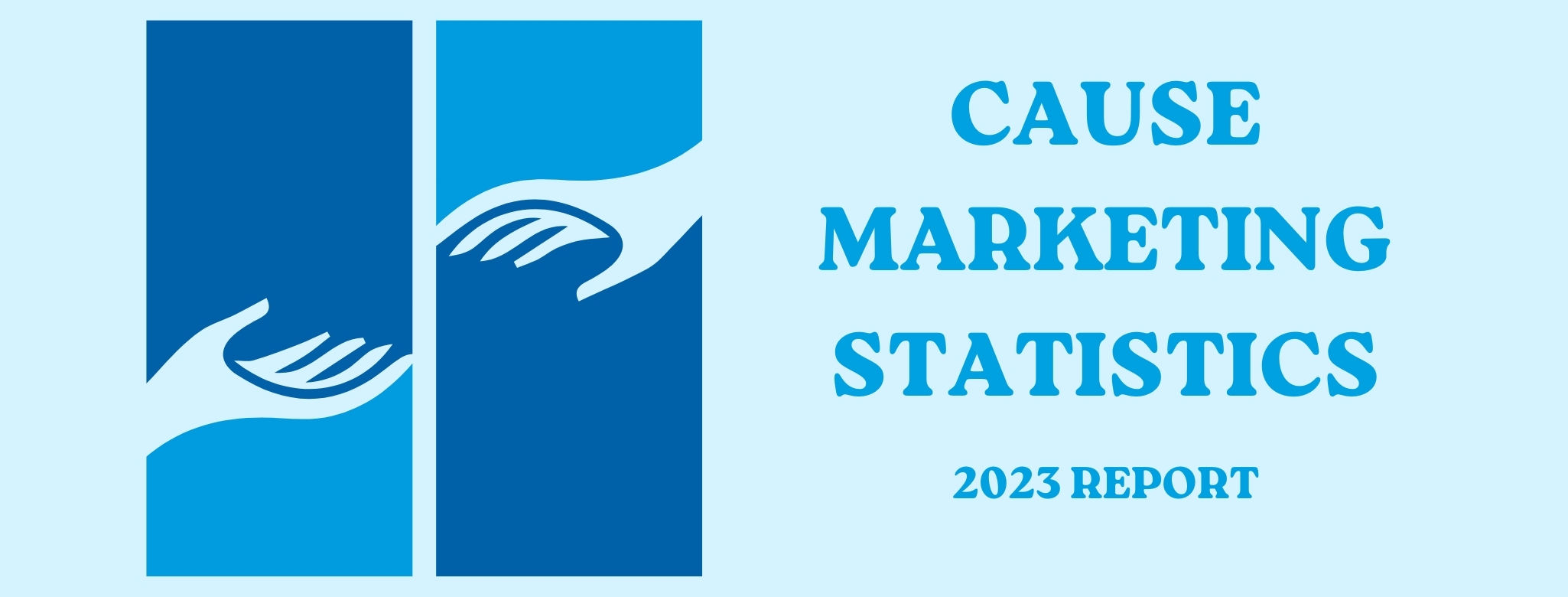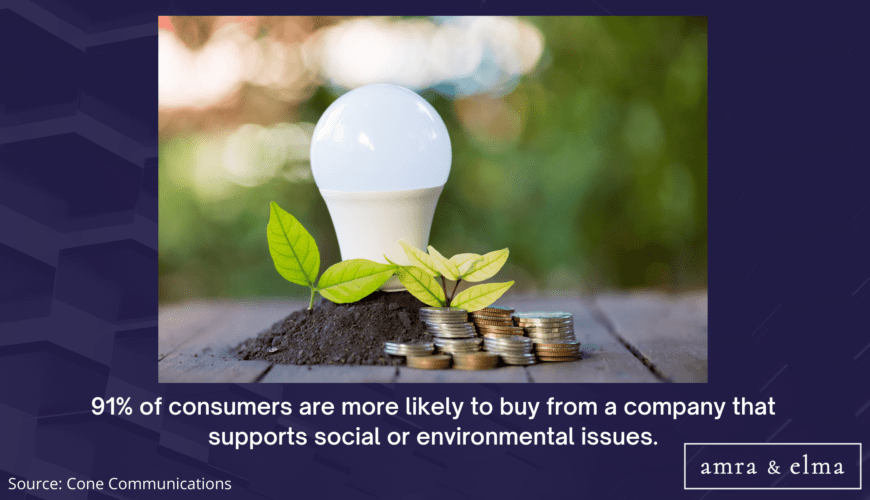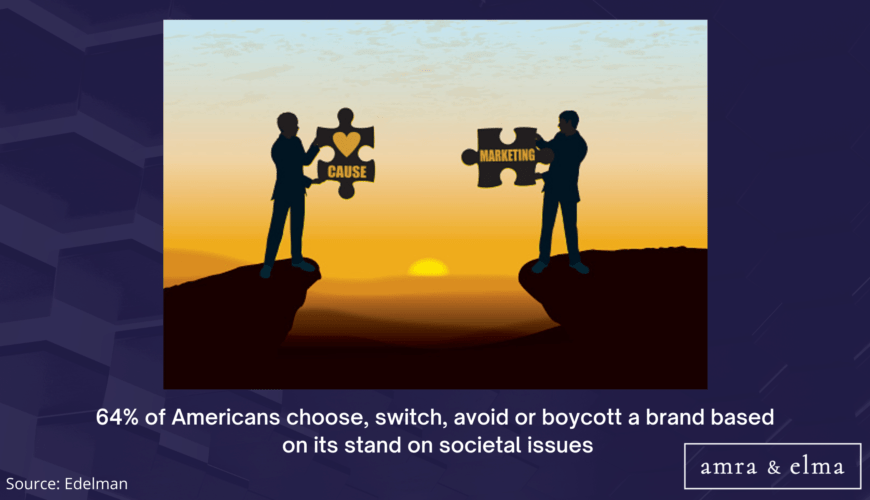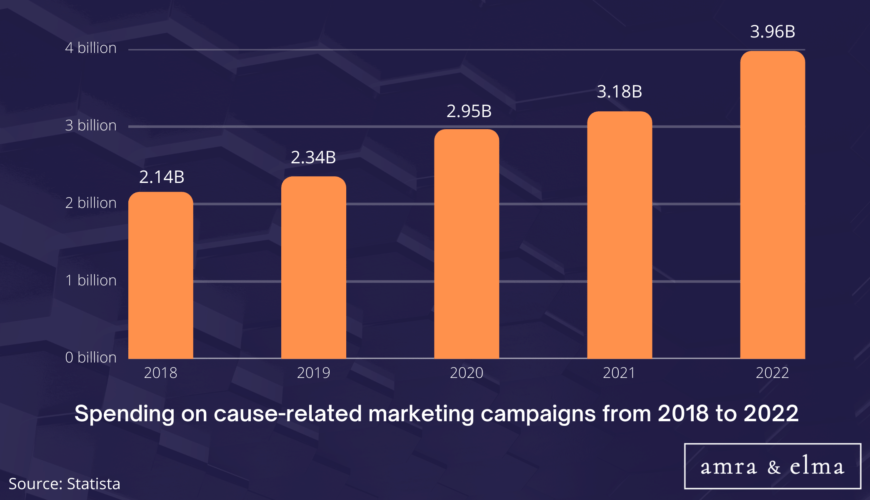
25 May TOP CAUSE MARKETING STATISTICS IN 2023
As the world progresses, so too does the way businesses operate. In recent years, there has been a shift in focus from simply making a profit to also having a positive impact on society. This is known as cause marketing. Cause marketing is a type of marketing that focuses on linking a company’s products or services to a particular social cause or issue. The aim of cause marketing is to not only raise awareness for the cause but also to generate sales for the company. In order to be successful, cause marketing campaigns need to be well-planned and properly executed. They also need to be relevant to the target audience and align with the company’s values. When done correctly, cause marketing can be a win-win for both the company and the cause. It can raise much-needed funds and awareness for important issues, while also helping to improve the reputation of the company.
Below, we highlight 15 key Cause Marketing statistics:
Cause Marketing Statistics (Editors Choice)
- 81% of consumers say brands must earn their trust
- 91% of consumers are more likely to buy from a company that supports social or environmental issues
- 28% of consumers will publicly praise a company when their personal beliefs align with what brands are saying
- 70% of companies reported an increased consumer demand for environmentally-friendly solutions
- 64% of Americans choose, switch, avoid or boycott a brand based on its stand on societal issues
- Spending on cause-related marketing is expected to reach $3.96 billion in 2022
Cause Marketing Statistics: 15 Top Cause Marketing Statistics in 2023!
As consumers become more interested in social and environmental issues, they are increasingly looking for companies that share their values. A study by Cone Communications found that 91% of consumers are more likely to buy from a company that supports social or environmental causes. This shift in consumer behavior presents a major opportunity for companies that are committed to making a positive impact. By aligning themselves with social and environmental causes, companies can not only attract new customers, but also build brand loyalty and trust. In today’s business climate, supporting social and environmental causes is not just good for the planet, it’s good for business.

Cause Marketing Statistics #2: 81% of consumers say brands must earn their trust.
With the rise of social media, consumers are now more aware of the brands they buy from and the company’s values. In fact, according to recent research by Sprout Social, 81% of consumers say brands must earn their trust and 66% think brands should take a stand on social and political issues. This is because consumers want to know that their money is going to a company that shares their values. For example, if a customer is interested in buying eco-friendly products, they will likely research the company’s sustainability practices before making a purchase. Or, if a customer is looking for a brand that supports social causes, they might seek out companies that have made public statements or taken action on issues such as racial justice or LGBTQ+ rights. In today’s climate, it is more important than ever for brands to be transparent about their values and build trust with their customers.
While it is true that brands cannot directly change people’s opinions on social issues, they can still affect change by taking a stand and announcing their support for specific causes. According to a survey by Sprout Social, sixty-six percent of respondents say that posts from brands rarely or never influence their opinions, but that doesn’t mean that those posts are ineffective. In fact, 39% of respondents believe that brands are more effective on social media when they encourage followers to take specific steps to support causes, such as making donations or participating in events. This shows that brands have the power to effect change, even if they cannot directly change people’s minds. By taking a stand and supporting important causes for their customers, brands can show that they are committed to making a difference.
Cause Marketing Statistics #4: Consumers say brands are most credible when an issue directly impacts their customers (47%), employees (40%) and business operations (31%)
According to a survey conducted by Sprout Social, consumers say brands are most credible when an issue directly impacts their customers (47%), employees (40%) and business operations (31%). This is in line with what we would expect – that people are more likely to believe a brand if they can see that the brand is affected by the issue in question. However, it’s also worth noting that almost one-third of respondents said they would trust a brand even if the issue didn’t directly impact the brand. This suggests that there is still some goodwill towards brands, even if they’re not perfect. In other words, consumers are willing to give brands the benefit of the doubt, as long as they are seen to be trying to do the right thing.
Cause Marketing Statistics #5: 28% of consumers will publicly praise a company when their personal beliefs align with what brands are saying.
According to a survey conducted by Sprout Social, consumers’ most common emotional reactions to brands taking a stand on social were positive, with intrigued, impressed and engaged emerging as the top three consumer reactions. Likewise, when consumers’ personal beliefs align with what brands are saying, 28% will publicly praise a company. When individuals disagree with the brand’s stance, 20% will publicly criticize a company. Despite the potential risks associated with taking a stand on social issues, it is clear that there is also significant potential for reward. Brands that can navigate these waters effectively can build loyalty and trust among their customer base, ultimately leading to increased sales.

According to Sprout’s research, 66% of respondents feel it’s important for brands to take a public stance on leading social and political issues like immigration, human rights and race relations. In fact, 61% of respondents say it’s important for brands to take stands on social media specifically. These findings suggest that consumers are increasingly looking to brands to take a stand on the issues that matter to them. With social media playing such a central role in the way we communicate, it’s no surprise that consumers are using it to hold brands accountable for their values. As we enter a new era of social responsibility, brands that fail to take a stand on the issues that matter to their customers will risk being left behind.
Cause Marketing Statistics #7: 46% of consumers pay close attention to a brand’s actions.
According to a survey by Mailchimp, 46% of consumers pay close attention to a brand’s actions. This means that businesses need to be mindful of their public image and how their actions might reflect on their brand. A company that is seen as unethical or irresponsible could quickly lose the support of its customers. In today’s competitive marketplace, it is essential for businesses to not only meet the needs of their customers but also to nurture a positive relationship with them. This can be done through responsible business practices, clear and open communication, and a commitment to customer satisfaction. By paying attention to the way they are perceived by the public, businesses can ensure that they are taking the necessary steps to maintain a positive relationship with their customers.
Cause Marketing Statistics #8: 70% of companies reported an increased consumer demand for environmentally-friendly solutions.
According to Forbes, 70% of companies are reporting an increased consumer demand in environmentally-friendly solutions. This shift towards sustainability is being driven by a variety of factors, including the need to reduce carbon emissions, protect natural resources, and improve public health. As consumers become more aware of the environmental impacts of their choices, they are increasingly choosing to support businesses that are taking steps to reduce their footprint. This change in consumer behavior is having a major impact on the way businesses operate, and it is guiding companies towards more sustainable practices. While there is still a long way to go, the increasing demand for environmentally-friendly solutions is a hopeful sign that businesses are beginning to realize the importance of sustainability.

A new study from consulting firm DoSomething Strategic found that 71% of Gen Z consumers said their impression of a brand is positively impacted by its association with a social cause. The study surveyed 1,000 13- to 24-year-olds and found that nearly three-quarters of respondents would be more likely to purchase products from brands that support social or environmental causes. What’s more, 57% said they would take action on behalf of a brand – such as sharing content or promoting the brand to their friends – if they knew the brand supported a cause they cared about. The study’s findings suggest that brands need to do more than simply donate money to causes – they need to be openly and actively involved in the issues their customers care about. Only then will they be able to build the strong, authentic relationships that are so essential to success in today’s marketplace.
Cause Marketing Statistics #10: 67% of consumers said transparency in business practices is essential for brands to prove authenticity.
A new survey conducted by SAP SE announced that a majority of consumers believe that transparency in business practices is essential for brands to prove their authenticity. The survey, which polled 10,000 consumers in 10 different countries, found that 67% of respondents said transparency was key when judging a brand’s authenticity. In addition, 60% of consumers said they were more likely to buy from a company that was transparent about its business practices. These findings suggest that brands need to be more open and honest with their customers in order to build trust and loyalty. Consumers are increasingly interested in knowing where their products come from and how they are made, so businesses need to be prepared to provide this information. Those who don’t may find themselves at a disadvantage in the marketplace.
Cause Marketing Statistics #11: 88% of Americans are more willing to forgive a company for making a mistake if it genuinely tries to change.
According to Porter Novelli’s Business of Cancel Culture Study, 88% of Americans are more willing to forgive a company for making a mistake if it genuinely tries to change and 73% say they are less likely to cancel a company if it is Purpose-driven. Both of these numbers underscore the importance of corporate accountability and the vital role that Corporate Social Responsibility (CSR) plays in protecting brands from the risk of being cancelled. In an era when technology makes it easy for consumers to quickly (and publicly) hold companies accountable for their actions, CSR has become essential for building trust and maintaining a positive reputation. A company that is seen as purpose-driven and committed to making a positive impact is much less likely to face the wrath of cancel culture than one that is perceived as being indifferent or even hostile to social responsibility. As the Business of Cancel Culture Study shows, Americans are increasingly holding companies accountable for their actions and expecting them to do better. Those that fail to rise to the occasion will do so at their own peril.

Cause Marketing Statistics #12: 64% of Americans choose, switch, avoid or boycott a brand based on its stand on societal issues.
According to Edelman’s Earned Brand Study, 64% of Americans choose, switch, avoid or boycott a brand based on its stand on societal issues. This is a significant increase from 2017, when only 53% of respondents said they would do so. The study also found that brands that take a stand on social or political issues are more likely to be seen as trustworthy and authentic. In addition, consumers are more likely to be Loyalists (those who are extremely loyal to a brand) if they perceive the brand to be purpose-driven. These findings suggest that brands need to be aware of the growing importance of social responsibility, and should consider how they can use their platform to make a positive impact on the world.
These are the findings of a new survey announced by SAP SE, the world’s largest business software company. The survey, which polled 1,000 U.S. consumers, found that 63% of respondents said they preferred to purchase holiday gifts from brands that support specific social causes. When asked why this was important to them, respondents cited a desire to make a positive impact on the world (48%), followed by a belief that companies have a responsibility to give back to society (38%). The survey also found that millennials were more likely than other age groups to say that they would be willing to pay more for products and services from companies that supported social causes (62% vs. 53%). “These findings underscore the growing importance of purpose-driven brands,” said SAP Chief Marketing Officer Francisco Martinelli. “As consumers become more socially and environmentally conscious, they are looking for brands that share their values and are making a positive impact on the world.”
According to the latest data by Statista, spending on cause-related marketing has grown from US$816 million in 2002 to $2.14 billion in 2018. This figure is expected to rise to $3.96 billion in 2022, as more and more businesses look to align themselves with social causes. While some critics argue that cause-related marketing is simply a way for businesses to make a profit while pretending to care about social issues, there is no denying that it can be an effective way to raise awareness and funds for important causes. In addition, cause-related marketing can help to build goodwill and create a positive association with a brand. Ultimately, whether or not cause-related marketing is truly effective is up for debate. However, there is no doubt that it is becoming increasingly popular, and it is likely that we will see even more businesses getting involved in the coming years.

Cause Marketing Statistics #15: Leading cause type supported by global corporations is environment.
According to the latest report by Statista, the majority of corporate ad campaigns supported environmental causes (19%), followed by diversity causes with 18 percent and health causes with 17 percent. The study shows that companies are beginning to realize the importance of aligning their values with those of their customers. In an increasingly competitive marketplace, consumers are gravitating towards brands that share their beliefs and priorities. By supporting causes that are important to their customers, businesses can not only improve their bottom line, but also make a positive impact on the world.
Conclusion
This report has outlined some of the most important cause marketing statistics for 2023. If understood correctly, cause-related marketing campaigns can be a powerful marketing tool that can help brands connect with their customers on a deeper level. It can also be used to build brand awareness and loyalty and drive sales. It is more important than ever for brands to stay relevant and top-of-mind with their customers in today’s ever-changing landscape. By using cause-related marketing strategies, brands can ensure that they are positively impacting the world while also meeting their business goals.
TOP CAUSE MARKETING STATISTICS IN 2023- FAQ
Is cause marketing effective?
Cause marketing is one of the most effective ways for businesses to give back to community. By aligning their brand with a worthy cause, businesses can increase sales, strengthen brand awareness and loyalty, and inspire employees. In addition, cause marketing can help to build relationships with customers and partners. When done well, cause marketing can be a win-win for everyone involved.
What is cause marketing strategy?
Cause marketing strategy involves a collaboration between a for-profit business and a nonprofit organization for a common benefit. Cause marketing can also refer to social or charitable campaigns put on by for-profit brands. Typically, a brand’s association with a nonprofit will boost their corporate social responsibility.
What are the criticisms of cause marketing?
Critics of cause marketing argue that people see through it – consumers are sick of brands pretending to care about social and charitable causes. These critics have two things on their side: Regular, high-profile fails and documented public skepticism.
What is an example of cause marketing?
The best example of cause marketing is for instance: if you’ve ever completed a transaction with a donation to a foundation, you’ve participated in a cause-related campaign. Oftentimes, companies will partner with a nonprofit organization for campaigns.
What is cause marketing?
Cause marketing is a type of marketing that focuses on promoting and supporting a good or service while also trying to raise awareness and funds for a particular cause. It is often done in partnership with nonprofit organizations and can be very effective in raising money and awareness for important causes.
There are a few key things to keep in mind when planning a cause marketing campaign. First, it’s important to select a cause that is relevant to your business and your customers. The cause should also be something that your customers feel passionate about and are willing to support. Second, make sure the campaign is well-organized and has a clear goal. You want to make sure people know what they’re donating to and why it’s important. Finally, be sure to promote the campaign extensively. Use social media, email marketing, and paid advertising to get the word out.
If done correctly, cause marketing can be a powerful way to raise money and awareness for important causes. It can also help build goodwill for your business, which can be beneficial in the long run.
Why is cause marketing so popular?
Cause marketing is becoming very popular in recent years because it allows businesses to support a good cause while also promoting their brand. To be successful, it is important to choose a cause that is relevant to the company’s products or services and that customers will care about. It is also important to create clear and specific goals for the campaign and to ensure that the marketing messages are consistent with the company’s overall branding. Finally, it is essential to track the results of the campaign so that progress can be measured and improvements can be made.
In conclusion, cause marketing is beneficial for both companies and nonprofits alike. It allows businesses to increase their profits while also contributing to a good cause. It also helps nonprofits raise money and awareness for their causes. Thus, cause marketing is an effective way for companies and charities to work together for the common good.
What are the key benefits of cause marketing?
There are several benefits for companies that engage in cause marketing. First, companies can increase their sales and profits by promoting their products or services through a trusted nonprofit organization. Consumers are more likely to buy a product if they know that a portion of the proceeds will go to a good cause. Additionally, companies can improve their image by associating themselves with a reputable nonprofits. Customers will see the company as being compassionate and caring, which can lead to increased loyalty and brand awareness.
For nonprofits, cause marketing is a great way to raise money and awareness for their cause. When a company partners with a nonprofit, they donate a percentage of the sales from their products or services to the charity. This money can be used to support the organization’s mission and programs. Additionally, partnering with a company can help promote the nonprofit’s message to a wider audience. Many people are more likely to donate money or get involved with a charity if they are contacted through their favorite commercial or retail outlet.
Why do brands need cause marketing?
There are many reasons why brands need cause marketing, but here are some of the most important ones:
- Cause marketing can help build a stronger connection with customers.
When customers feel like a brand is making a real effort to make a difference in the world, it can help them feel more connected to that brand. This can lead to increased loyalty and even advocacy for the brand, making cause marketing a very important tool.
- Cause marketing can help create a positive image.
Cause marketing can help brands create a positive image in the eyes of customers and the public. Cause marketing can be especially beneficial if the cause that the brand is supporting is seen as being noble or important.
- Cause marketing can help drive sales and revenue.
While cause marketing is not necessarily about making money, it can often have a positive impact on sales and revenue. When customers feel good about a brand, they are more likely to purchase its products or services, making cause marketing an essential tool for brands.
Why is cause marketing so important?
There are many reasons why cause marketing is so important. To start, cause marketing can be incredibly effective in terms of building brand awareness and loyalty. By aligning your company with a good cause, you can show consumers that you care about more than just making money – you also care about helping others. This can make consumers more likely to do business with you, and it can also help you stand out from your competitors with the help of high-impact cause marketing campaigns.
Additionally, cause marketing can be a powerful tool for fundraising. When done correctly, cause marketing can encourage people to donate money or time to your charity partner, which can help them achieve their goals. Furthermore, by getting involved with a charity, your company can also improve its reputation among consumers and the public. When you use cause marketing strategies, people will see you as a responsible and caring business, which can lead to more success in the long run.
In conclusion, there are many reasons why cause marketing is so important. Generally, cause marketing can help build brand awareness and loyalty, fundraise effectively, and improve your reputation. If you’re looking for a way to connect with consumers and make a positive impact on the world, then cause marketing is the way to go.

